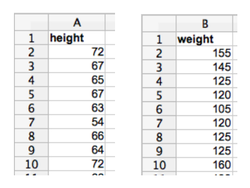Use the following quiz questions to check your understanding of density curves and normal distributions. Note that as soon as you have indicated your response, the question is scored and feedback is provided. As feedback is provided for each option, you may find it useful to try all of the responses (both correct and incorrect) to read the feedback, as a way to better understand the concept.
Association between variables
Association between variables
The image at right displays the first 9 observations for two variables: height and weight. Would it be reasonable to investigate whether or not height is related to weight using the data provided?
- Yes
- That's not quite right. Although height and weight may in fact be related, to establish a relationship the measurements for both variables must be from the same observations. Try again.
- No
- That's not quite right. To establish a relationship the measurements for both variables must be from the same observations. It is not clear from the image provided whether or not the measurements for each variable are for the same individuals. Try again.
- Cannot determine
- That's correct. Although height and weight may in fact be related, to establish a relationship the measurements for both variables must be from the same observations. It is not clear from the image provided whether or not the measurements for each variable are for the same individuals.
Roles for variables
Roles for variables
- In an experiment on the effect of sleep on memory, number of hours of sleep is the explanatory (explanatory/response) variable; recall score on a memory test is the response (explanatory/response) variable.[1]
- That's correct. The researchers hypothesized that the number of hours of sleep explains how well a person does on a memory recall test. The number of hours of sleep is the explanatory variable and recall score on a memory test is the response variable.
- That's not quite right. The researchers hypothesized that the number of hours of sleep explains how well a person does on a memory recall test. Try again.
- In a study of the effect of handedness on athletic ability, participants were divided into three groups: right-handed, left-handed, and ambidextrous. Athletic ability was measured on a 12-point scale. Athletic ability is the response (explanatory/response) variable; handedness is the explanatory (explanatory/response) variable.[2]
- That's correct. The researchers hypothesized that handedness explains a person's athletic ability. Handedness is the explanatory variable and athletic ability is the response variable.
- That's not quite right. The researchers hypothesized that handedness explains a person's athletic ability. Try again.
- In a study of weight at birth for a sample of in-hospital births, researchers were interested in whether or not the mother smoked during preganancy. The baby's birth weight is the response (explanatory/response) variable; whether or not the mother smoked is the explanatory (explanatory/response) variable.
- That's correct. The researchers hypothesized that whether or not the mother smoked during pregnancy explains the baby's weight. Whether or not the mother smoked is the explanatory variable and the baby's weight is the response variable.
- That's not quite right. The researchers hypothesized that whether or not the mother smoked during pregnancy explains the baby's weight. Try again.
- A response variable may be considered a(an) dependent (independent/dependent) variable, and an explanatory variable may be considered a(an) independent (independent/dependent) variable.
- That's correct. As a response variable depends on an explanatory variable, it may also be referred to as dependent, with the explanatory variable considered independent.
- That's not quite right. As a response variable depends on an explanatory variable, it may also be referred to as dependent, with the explanatory variable considered independent.
Roles for variables
- For which of the following relationships would it be better to explore the relationship without assigning the variables as exploratory and response? (Check all that apply.)
- The relationship between SAT reading and math scores
- That's correct. Although reading and math scores are likely associated, there is no obvious reason to assign a particular explanatory/response relationship. Either one could just as easily explain the other.
- The relationship between parents' income and amount of student loans for undergraduate study
- That's not quite right. Parents' income is often a factor in how much a student borrows in order to pay for college. Parents' income would be the explanatory variable; amount of student loans would be the response.
- The relationship between number of beers consumed in two hours and blood alcohol level
- That's not quite right. It is well established that how much alcohol a person consumes (in this case, beer) results in (causes) a particular blood alcohol level.
- The relationship between grip strength and arm strength
- That's correct. Although the two strength measures are likely associated, there is no obvious reason to assign a particular explanatory/response relationship. Either one could just as easily explain the other.
Notes
- ↑ Adapted from Variables at Online Statistics Education: An Interactive Multimedia Course of Study. Project Leader: David M. Lane, Rice University. Retrieved 9 September 2012.
- ↑ Adapted from Variables at Online Statistics Education: An Interactive Multimedia Course of Study. Project Leader: David M. Lane, Rice University. Retrieved 9 September 2012.
